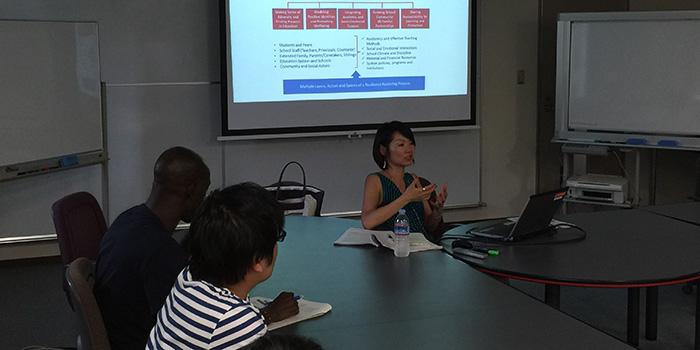Dr. Aiko Sakurai’s Farewell Party
We had a farewell party for Dr. Aiko Sakurai in a BBQ Restaurant near JRRokkomichi on April 16, 2014.Dr. Sakurai is not only an Associate Professor in GSICS and has...
Graduate School of International Cooperation Studies (GSICS), Kobe University


Dr. Tomomi Miyajima, an Education Specialist with the World Bank gave a lecture in the development management policy seminar. The seminar was held on Tuesday 18th August 2015 in the 6th Simulation Room of Kobe University’s Graduate School of International Cooperation Studies (GSICS). The title of her presentation was “Promoting Resilience in Conflict Affected States in the Middle East through School-Based Development”. The participants during the seminar comprised of students from GSICS, other Kobe University faculties and Japan International Cooperation Agency (JICA).
 Dr. Miyajima began her presentation by asserting that various conflicts and crises are happening in the Middle East. She highlighted the fact that these conflicts and crises affect all countries in the Middle East and North Africa (MENA) region, as well as countries from other regions. Citing the examples of Syria and Yemen, Dr. Miyajima used photos to demonstrate how long-lasting, far-fetching conflicts are causing severe damages to human life, infrastructure and socio-economic systems in general. She specifically elaborated on the negative effects of the conflict on the implementation and operation of World Bank’s projects and activities in Yemen.
Dr. Miyajima began her presentation by asserting that various conflicts and crises are happening in the Middle East. She highlighted the fact that these conflicts and crises affect all countries in the Middle East and North Africa (MENA) region, as well as countries from other regions. Citing the examples of Syria and Yemen, Dr. Miyajima used photos to demonstrate how long-lasting, far-fetching conflicts are causing severe damages to human life, infrastructure and socio-economic systems in general. She specifically elaborated on the negative effects of the conflict on the implementation and operation of World Bank’s projects and activities in Yemen.
Dr. Tomomi Miyajima went on to share with the audience the World Bank’s response of providing support for the fragile and affected countries. In addition, she showed how some schools continue to perform well despite the challenges. Specifically, she presented findings from a study she and her colleagues (Dr. Abdul Hamid and Dr. Harry Patrinos) conducted in 2014 in West Bank, Gaza and Jordan. The study focused on students and teachers in United Nations Relief and Works Agency (UNRWA) schools. Findings show that despite the hardships that students and teachers in UNRWA schools face, they perform way better than their peers in public schools.
The performance of teachers and students from UNRWA schools was assessed in comparison with public schools, based on selected measures/ variables from Trends in International Mathematics and Science Study (TIMSS), Program for International Students Assessment (PISA) and National Assessment for Knowledge Economy (NAfKE) data sets. Dr. Miyajima concluded her presentation by sharing with the audience a resilience framework and resilience approach adopted and implemented in UNRWA schools. She clarified the fact that resilience is not an outcome in itself, but a process in the context of adversity.
Her concluding remark was followed by an engaging question and answer session, which not only enabled the participants to ask questions, but also allowed her to clarify on some of the issues of concern and interest to the audience.
Authored by Jeje Moses Okurut
Doctoral Candidate
Related link
http://www.kobe-u.ac.jp/en/NEWS/event/2015_08_18_01.html